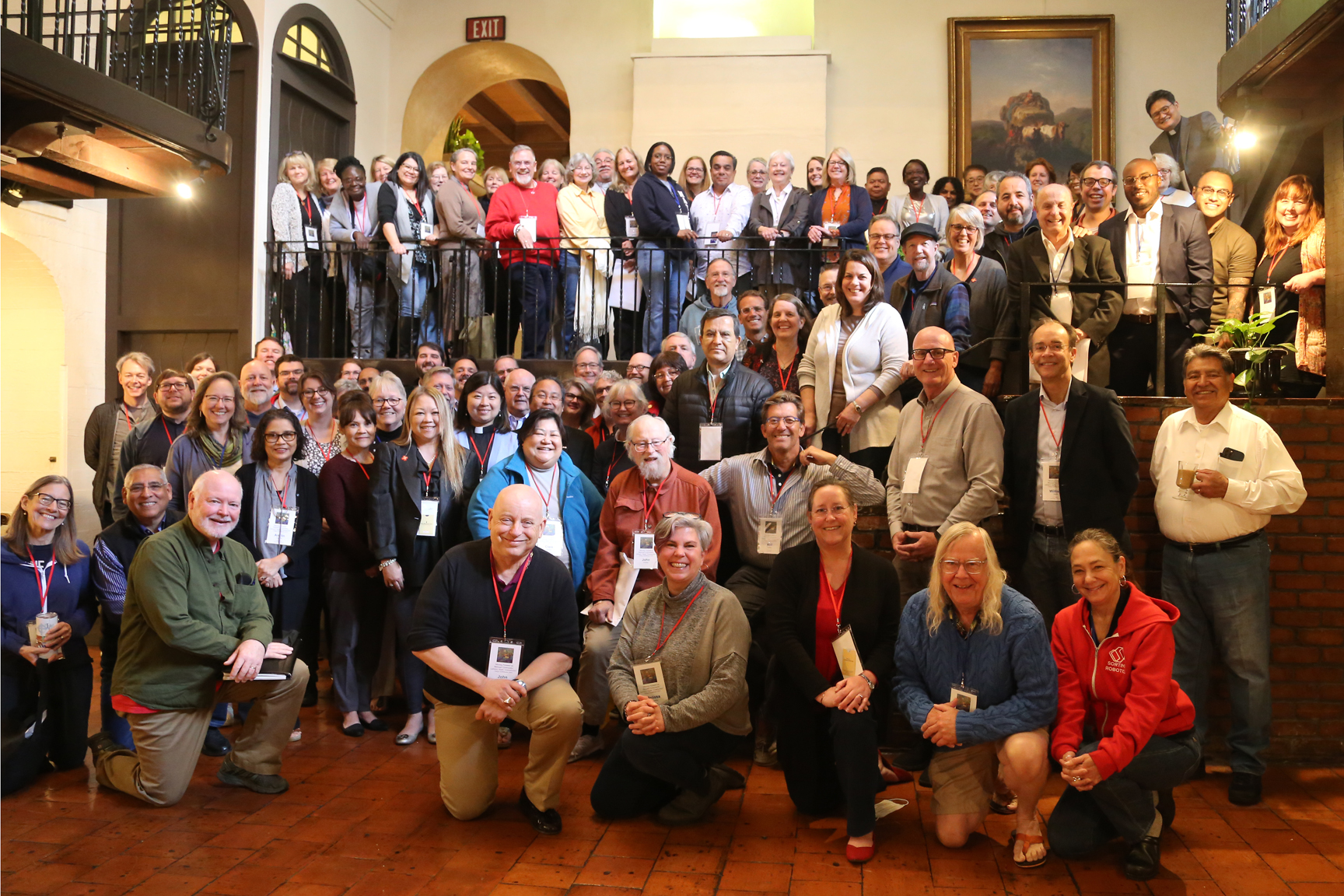
Bishop John Harvey Taylor and Canon to the Ordinary Melissa McCarthy pose with priests, deacons and diocesan staff members at the 2023 Clergy Conference, held May 1 – 3 at the Mission Inn, Riverside. Photos: Janet Kawamoto
[The Episcopal News] Ministry has always been a challenge, and may be especially so in the current cultural moment, but clergy of the Diocese of Los Angeles found new energy during this year’s Clergy Conference, meeting May 1 – 3 at the Mission Inn in Riverside under the theme “Moving Forward as Beloved Community: Lament, Hope, and Communion.”
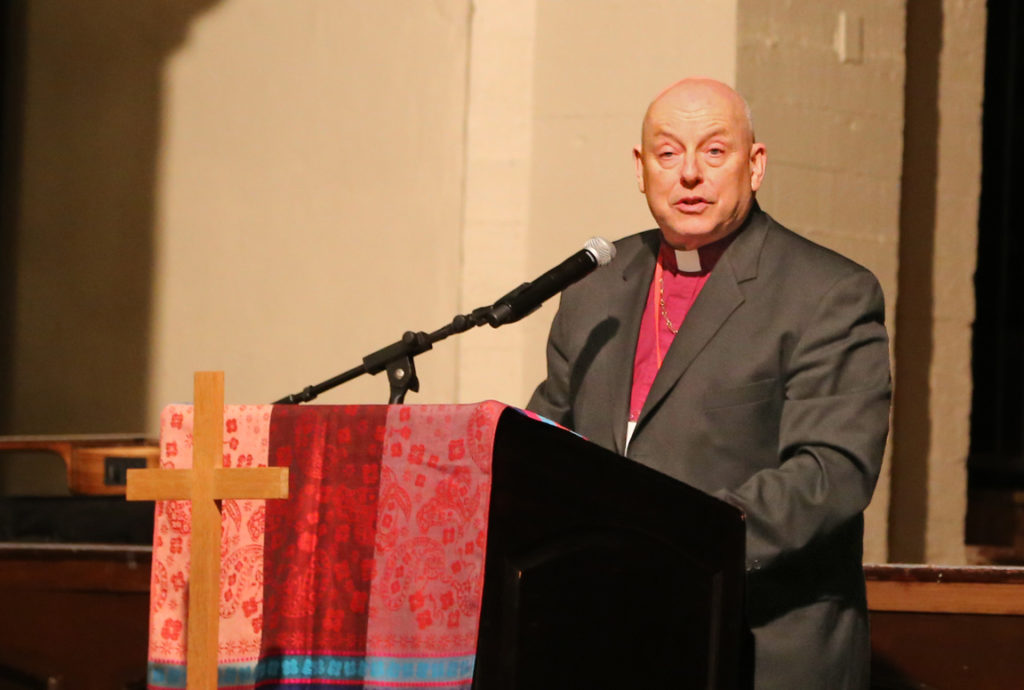
Bishop John Harvey Taylor welcomes the assembled clergy at the opening reception and Taizé worship service.
The conference opened on Monday evening with a reception featuring a welcome from Bishop John Harvey Taylor, in which he reminded the clergy that ministry in difficult times is nothing new. He pointed out that that chapter 2 of the book of Acts makes the early church in Jerusalem sound impossibly idyllic. “It’s just such a wonderful and happy thing to read about. People were all together and in perfect agreement, praising God, performing miracles and wonders, owning everything in common. That’s always a fun one,” he said, as the clergy laughed in response.
“I have never in my life known human beings to behave that way. Not now, not ever. … And in the first century, it was an anxious time and people were oppressed and living lives of scarcity, dealing with the impossible paradox, the resurrection, which we still grapple with. Do we really think people were acting that way? My friends, it’s a press release, written half a century later.
“The churches [Paul] wrote to were bickering over doctrine, how to serve Holy Eucharist. They were breaking into leadership factions, and they were failing to send enough money for famine relief to Jerusalem, where things were supposed to be so perfect. That sounds like our church; let us rejoice and be glad in it! Things have not gotten worse.”
He warned against idealizing the church of the past. “It was never as good as we thought it was, especially for all of those who we were excluding and oppressing, whom we sometimes don’t think about in our moments of rosy nostalgia.”
Taylor also outlined three priorities for the year:
- Building affordable housing on 25% of church properties in the diocese;
- Collaborating; encouraging churches to share resources, possibly including clergy;
- Interrogating; “breaking down the barriers that impede the growth, the wholeness and the justice of Christ’s own church by expressing gospel curiosity about our neighbors across all the barriers of distance and discord, being curious all the ways and accountable as need be, putting our privilege and our preference on the line. All for the glory of God, for the sake of God’s people.”
Canon to the Ordinary Melissa McCarthy and the Rev. Canon Thomas Quijada-Discavage and the Rev. Norma Guerra of the Office of Formation & Transition Ministry, organized the conference around the story of the journey to Emmaus from the Gospel of Luke. The program was replete with worship, song, discussion and sharing, informed by insights from keynoter Debie Thomas, author of Into the Mess and Other Jesus Stories, a columnist and contributing editor for The Christian Century, and minister of Lifelong Formation at St. Mark’s Episcopal Church in Palo Alto, California.
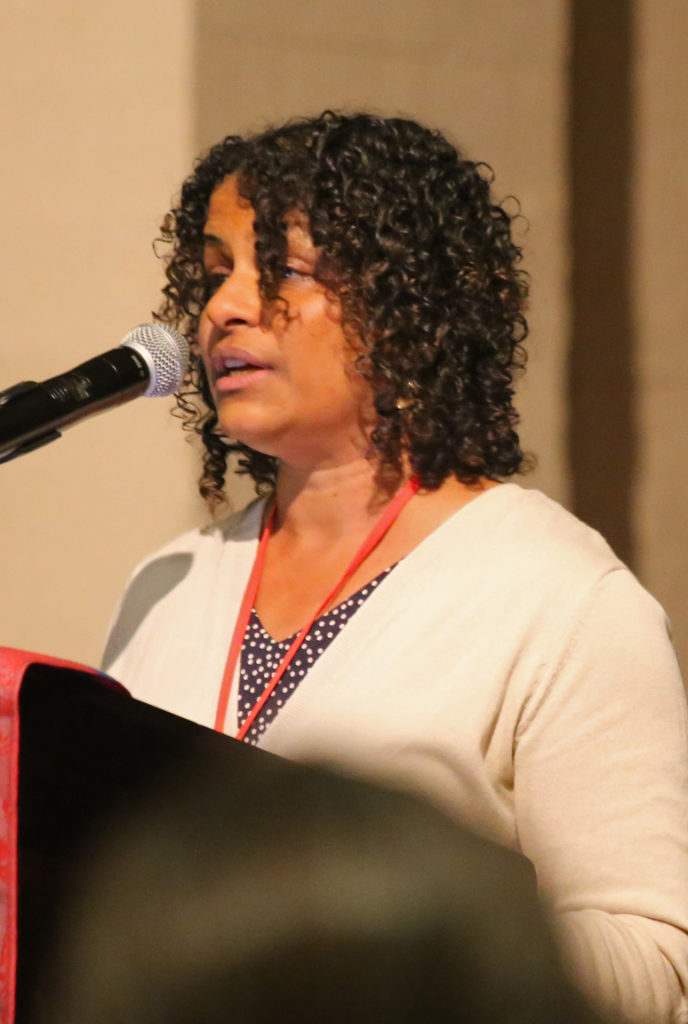
Author and lay formation minister Debie Thomas delivers a keynote address at Clergy Conference.
In the first of her three presentations, titled “Lament,” Thomas said that the two men who set out from Jerusalem on the first Easter began by lamenting the death of Jesus and expressing their disappointed hope that he was the Messiah. They found new hope when they recognized the risen Christ after he explained recent events in the light of the scriptures and stayed with them to break bread. When they returned to Jerusalem and shared their experience with other disciples, they helped to build communion by accepting that the resurrection had changed their expectations and determined their future course.
“We chose this theme because these are complicated days for many of us in ministry,” said Thomas. “We are trying – with varying degrees of success – to “return” to some version of normal after three-plus years of a global pandemic that upended both our institutions and our assumptions about what it means to be church. We need to figure out who we are now. What has changed? What still needs to change? And what treasures from our tradition can we usefully hold onto?
Thomas said that the Emmaus story is one of her favorites “because it holds ample space for complexity. It doesn’t rush to joy, or premature consolation. It allows for contradiction, ambivalence, and messiness. And if there’s anything we need right now as we face an increasingly turbulent world, it is ample space for complexity.”
The Emmaus story makes room for lament, she said – something the “buttoned-up West” and especially the church, often resists. “We live in a grief-phobic, efficiency-obsessed culture that encourages us to approach sorrow as labor. As burden. As task. Think, for example, about the verbs we typically associate with grief: We work through grief. We manage grief. We process grief. We handle, bear, endure, survive, and overcome grief. No wonder the word makes us want to crawl into our beds and hide!”
Remarking on her own background as the daughter of immigrants from India – a pastor and his wife in a charismatic-evangelical community in Boston – she said there was much to be grateful for in her childhood experience. But, she said, “it was not an upbringing that offered me a healthy theology of grief. I grew up believing that Christians are supposed to exude joy, light, and hope to the world – pretty much all the time.”
Lament, she said, “is a response to brokenness, an act of recognition, and “an alignment of our hopes with the dream of God. Lament says: we were created for more, called to more, and destined for more.
“At the risk of putting it too bluntly: if we won’t grieve, we won’t love.”
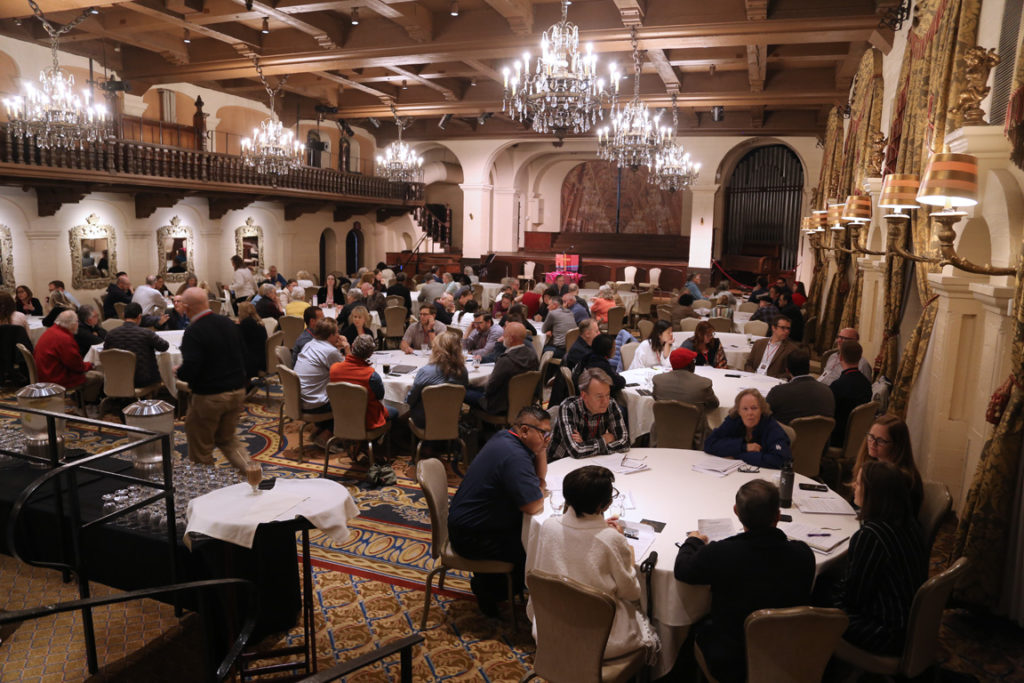
Clergy engage in table discussions after one of Debie Thomas’ presentations at clergy conference; what several participants termed “rich and full” conversations.
In her second presentation, Thomas focused on hope as expressed in the Emmaus narrative, noting that the still-unrecognized Jesus encourages the travelers to share their stories. “And then,” she said, “he creates a welcoming, hospitable space for them to speak. He offers them the gift of accompaniment. The gift of nurturing presence. When they are done – only when they are done, when the story of their lamentation has been fully articulated – Jesus takes their story and offers it back to them,” enlarging it and placing it within the narrative of history, “a sweeping, cosmic arc of redemption, hope, and divine love that spans the centuries. When Jesus tells the story, the hearts of his listeners burn.”
The Episcopal Church has a particular gift to give in this divisive age, she said. “We, as Episcopalians, have a radically hopeful story to tell. A story that this world – this world right now – desperately needs. At a moment when the language we hear all around us has become divisive, toxic, cheap, and outright hateful, we can offer the world the rich, beautiful, and time-honored language of liturgy.” The church, she said, also can offer acceptance, love, equality, justice and a sense that the earth is a sacred place.
“The wonderful truth is that the Gospel is astonishingly supple – and full of nearly absurd surprises. It holds hope and grief together — not in contrast, but in conversation, in relationship, in some sort of honest becoming. What I’ve come to know is that this messy, knotted place is precisely where God loves to show up, in the place where pain and possibility, delight and despair, muck and miracle, crash into each other.”
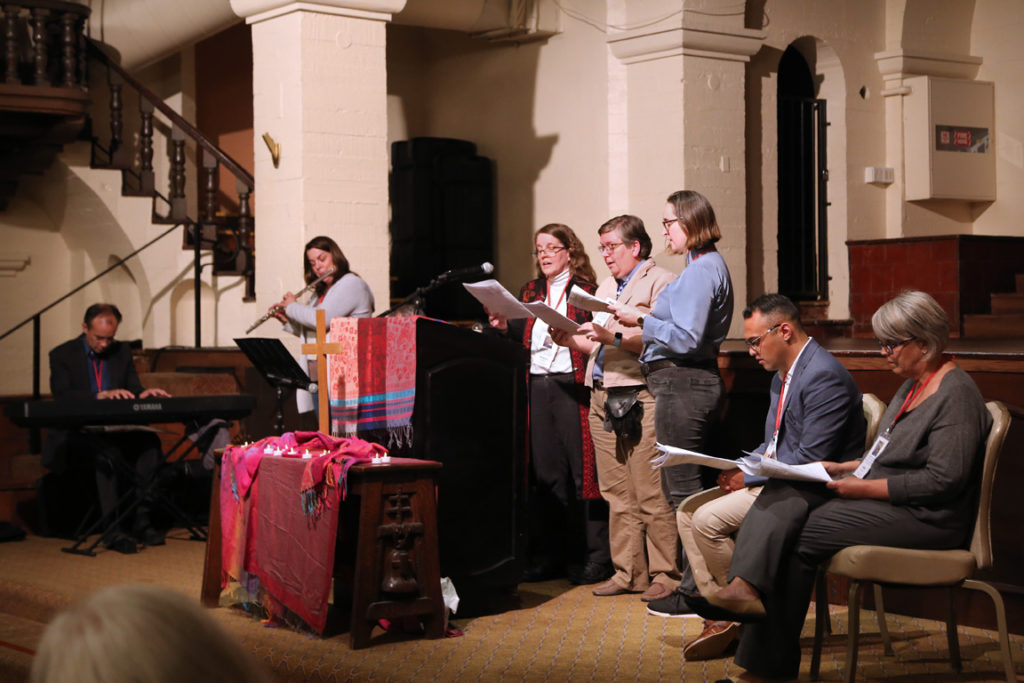
Clergy members lead Taizé worship on the first evening of Clergy Conference.
In her final presentation, Thomas asked the clergy to consider “communion” in light of the Emmaus story.
“I am perpetually surprised – and a bit undone – by Jesus’s patience and subtlety, which translate into an almost appalling commitment to our freedom. He will not impose. He will not overpower. He will not coerce. He’ll make as if he’s moving on – gently giving us the space, time, and freedom to decide what we want next. Do we desire to go deeper? Are we ready to get off the road of our disappointed hopes? Will we trust the burning of our hearts, even before we understand what it means? Will we welcome strangeness into our lives? Not only that – will we allow strangeness to host us into a new comprehension of our vocations, our ministries, our churches? We will allow an unfamiliar Jesus to feed us, to lead us, to show us a new way forward?”
She offered some possibilities. “Never dismiss the possibility of Jesus offering himself in guises you’ve never seen before. Trust in the Spirit who moves like the wind, coming and going as she chooses – in ways we’ll never pin down,” she said. “Second, don’t underestimate the power of small gestures. The Emmaus story ends when Jesus takes, blesses, breaks, and gives bread. So small a thing. So small a thing that changes everything. Third – and this is a big one – do the work necessary to allow the stranger to host you. Which is to say, be willing to share power and surrender privilege. Do whatever it takes – internally and externally – to make your table as inclusive, hospitable, and welcoming as you can. … And finally, number four: share what you have. Give, collaborate, lend, borrow. Don’t hoard. Don’t compete. … Ministry is not a competition.”
She challenged the clergy to think about what they might be able to share. “Financial resources? Time? A photocopy machine? An extra set of Godly Play materials or musical instruments? Space in your parish hall where a struggling congregation might gather on a Thursday evening? A deep capacity to fast and pray for your fellow clergy in this room?
“What do you have that might feed the elemental hungers of your Christian family? What can you offer to make deeper and more nourishing communion possible?”
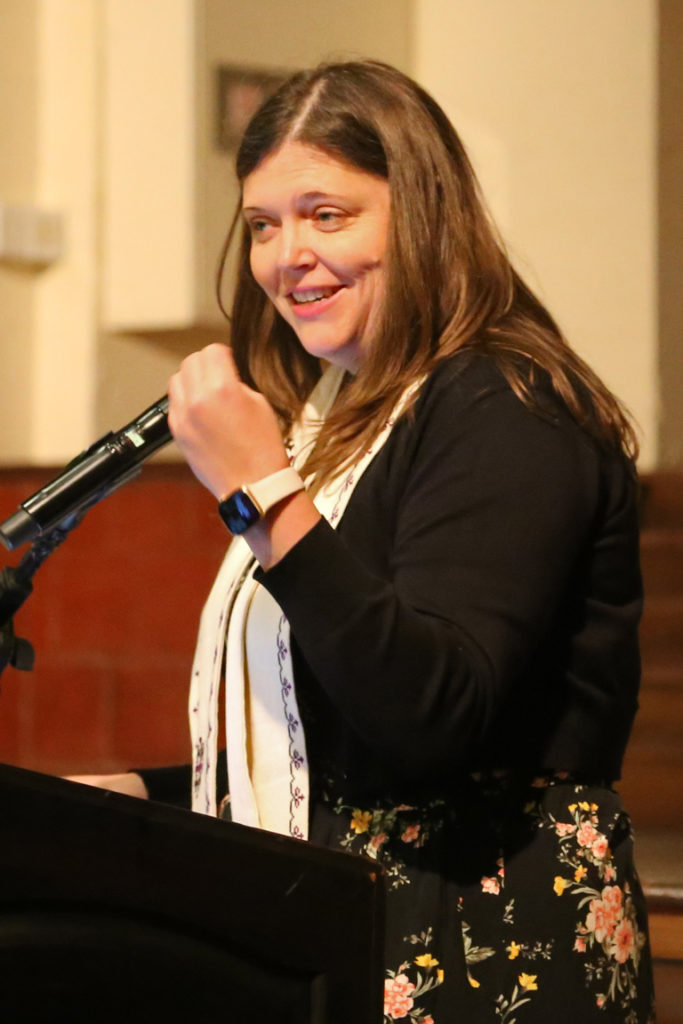
K.C. Robertson, assisting priest at St. Matthew’s Church, Pacific Palisades, delivers the sermon at the conference’s closing Eucharist on May 3.
Responding to Thomas’ presentations, the Rev. K.C. Robertson, assistant priest at St. Matthew’s Church, Pacific Palisades, dwelt in her sermon at the concluding Eucharist on two phrases: “but we had hoped,” which Thomas had also cited as the center of the disciples’ lament as they walked on the road to Emmaus; and a line from a poem by William Butler Yeats; “My heart is broken, yet must understand.”
Expressing both grief and gratitude for the difficulties and joys that clergy shared at Thomas’ invitation after her presentations, Robertson said, “We are complex, grief is complex, our diocesan road to Emmaus is clearly complex.
“… We as God’s embodied communion could remain dangerously close to the lamenting phase, stuck in our own ‘but we had hoped-ness,’ so much so that we abandon the ability to hope in Christ.”
She cited her own recent experience caring for her mother, who suffers from aphasia after a stroke but can still say “Good morning” (at any time of day); “How are you doing?”; “I love you all times’; and “Amen.”
“These four statements have gently coerced me into choosing hope in our circumstances,” Roberson said, “because I am reminded daily that resurrection is apparently at the core of my mother. Which then must mean that resurrection is at the core of each of us.”
“I invite and ask each of you: What can and must we do as the front line of the resurrection story that goes from a road of feeling hopeless to a road of knowing that hope abounds in front of us? What are you willing to do to intentionally shift towards hope?”
